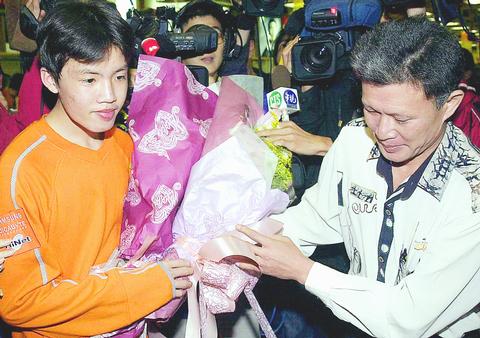Seventeen-year-old Tseng Jeng-cheng (曾政承) does not have the appearance of someone with an ardent political agenda. That's because he says he doesn't have one. The World Cyber Games Organizing Committee and the Chinese government, however, see matters differently.
On Dec. 9, Tseng won first place at the World Cyber Games (WCG) in Seoul, beating a Korean finalist at the game "Age of Empires II: The Conquerors."
The trouble came when, after delivering the final fatal blow in the game, Tseng rose from his seat and declared at the top of his voice "Taiwan No. 1!" and waved a national flag. It is a violation of the games' rules to display Taiwan's national flag.

This impulsive victory celebration was enough to incite a Chinese reporter from Chinese Central Television covering the event to rush the stage and object loudly to Tseng's display of Taiwan's flag. The row also invited an angry phone call from the Chinese embassy in Seoul to the WCG Organizing Committee, which in turn demanded an apology from Taiwan's team, participating under the name Chinese Taipei. The Chinese WCG team also demanded an explanation and apology.
In an "important announcement" on the WCG Web site, the WCG organizing committee says: "Although we send our congratulations to the winning player, we cannot condone the celebration which the Chinese Taipei team shared after this victory.
"We denounce this act by the Chinese Taipei team and strongly request an apology from them, as it has so blatantly put the entire World Cyber Games and all its participants in an undeserved and unwarranted position of political difficulty.

TAIPEI TIMES FILE PHOTO
"There is, and never will be, any room for insensitivity to political or social issues or assertion of political agendas."
Contacted Tuesday by telephone at a cybercafe in Taichung, where he was playing computer games, Tseng expressed surprise at the demand for an apology.
"Why do the Chinese get so worked up over a computer game? They're ridiculous."
"When I won I got up and shouted something like `Taiwan No. 1,' and then this Chinese reporter started making noise, but we ignored him and got off stage and walked away," Tseng said. "At the time I didn't know what he was harping on about."
Tseng is entirely disinterested in the political complexity of the situation, which touches the most sensitive nerve in relations between Taiwan and China, namely the issue of Taiwan's sovereignty.
The Chinese reporter's complaint, however, was not unfounded.
The World Cyber Games portends to be a cyber version of the Olympics and as such is conducted in the spirit of the Games. This includes Taiwan joining under the name Chinese Taipei and under a generic Olympic flag as dictated in an agreement Taiwan signed with the International Olympic Committee in 1981.
The agreement furthermore binds Taiwan to use the name Chinese Taipei at all international events when Chinese teams take part in competition and requires the Taiwanese side to convene a conference to explain these rules to athletes, coaches and managers before all competitions.
The responsibility to explain the rules of WCG participation to the Taiwanese gamers would fall on Aztec Technology, the cyber cafe chain that sponsored the Taiwanese team, but Tseng says he was never informed of the rules prohibiting the waving of Taiwan's flag.
As for an apology from the Taiwanese participants at the WCG, Tseng says plainly "apologize for what?"
Aztec is equally defiant. "There's no way we will apologize to the Chinese team, or anyone for that matter. We were never notified of rules relating to flags by the WCG," said Chen Hsiu-fen (陳秀芬), marketing director at Aztec.
Chen added that the WCG had previously penned an apology on behalf of Taiwan and posted it on its Web site without Aztec's permission. "We demanded that they remove that announcement because we didn't even write it -- and we will not write one like it for that matter."
Negotiations are ongoing between Aztec and the WCG over how to explain the issue and the wording of the announcement that is now on the Web site, which calls for an apology.
"The flag issue cuts to the core of cross-strait relations. China takes it very seriously and will use every opportunity to launch a protest when there is a violation to assert its political stance," said Joseph Wu (吳釗燮), deputy director of the Institute for International Relations at National Chengchi University.
The flag has been a bone of contention recently at other events as well.
At the opening ceremony of the 2001 AFC Women's Soccer Championship two weeks ago, Taipei Mayor Ma Ying-jeou (馬英九) begged spectators to not bring the nation's flag to the stadium. His request predictably had the opposite effect of encouraging boisterous protests and flag-waving.
And in October Chinese participants at the Ninth Asian Roller Skating Competition in Taitung threatened to withdraw from the event, having balked at the sight of their host nation's flag outside the competition venue. All Taiwan flags, however, had been removed from inside the stadium as required. The Chinese participants had even asked in advance that workers at their hotel remove any Taiwan flags from sight before their arrival.
"Any form of interaction with China, even in sports, and apparently computer games as well, is immediately politicized," Wu said.
The WCG organizing committee adopts the view that the flag issue is not a trivial matter. Steve Seo, the cyber games' marketing communications manager, was adamant that there had a been a blatant violation of rules, but struck a diplomatic tone. "Taiwan agreed to join as Chinese Taipei, so it must abide by the relevant rules. But we have made it clear to [the Taiwanese participants] that we want to handle this matter as friends for the sake of the gamers involved."
Seo said they had agreed to Taiwan's demand that the apology written on their behalf without their knowledge be removed from the Web site and that the English wording of the "important announcement" currently on the WCG Web site was incorrect, and that the organizing body wished only to "express its regret," rather than extract an apology from Chinese Taipei over Tseng's patriotic outburst. He attributed the error to a "cultural difference."
For his part, Tseng remains nonplussed by the turmoil triggered by his flag waving, in part because he won about US$35,000, not bad for a high-school dropout. Now he says he plans go back to school, improve his English and hopefully get into college. The money, after giving some to his teammates, will go to the bank.
Winning, he said, had changed his life in small ways, but the controversy had left him unmoved. In as close to a political statement as he could muster, Tseng said "I didn't think about China before all this, and I don't think about China now."

The Taipei Times last week reported that the rising share of seniors in the population is reshaping the nation’s housing markets. According to data from the Ministry of the Interior, about 850,000 residences were occupied by elderly people in the first quarter, including 655,000 that housed only one resident. H&B Realty chief researcher Jessica Hsu (徐佳馨), quoted in the article, said that there is rising demand for elderly-friendly housing, including units with elevators, barrier-free layouts and proximity to healthcare services. Hsu and others cited in the article highlighted the changing family residential dynamics, as children no longer live with parents,

The classic warmth of a good old-fashioned izakaya beckons you in, all cozy nooks and dark wood finishes, as tables order a third round and waiters sling tapas-sized bites and assorted — sometimes unidentifiable — skewered meats. But there’s a romantic hush about this Ximending (西門町) hotspot, with cocktails savored, plating elegant and never rushed and daters and diners lit by candlelight and chandelier. Each chair is mismatched and the assorted tables appear to be the fanciest picks from a nearby flea market. A naked sewing mannequin stands in a dimly lit corner, adorned with antique mirrors and draped foliage

The election of Cheng Li-wun (鄭麗文) as chair of the Chinese Nationalist Party (KMT) marked a triumphant return of pride in the “Chinese” in the party name. Cheng wants Taiwanese to be proud to call themselves Chinese again. The unambiguous winner was a return to the KMT ideology that formed in the early 2000s under then chairman Lien Chan (連戰) and president Ma Ying-jeou (馬英九) put into practice as far as he could, until ultimately thwarted by hundreds of thousands of protestors thronging the streets in what became known as the Sunflower movement in 2014. Cheng is an unambiguous Chinese ethnonationalist,

I was 10 when I read an article in the local paper about the Air Guitar World Championships, which take place every year in my home town of Oulu, Finland. My parents had helped out at the very first contest back in 1996 — my mum gave out fliers, my dad sorted the music. Since then, national championships have been held all across the world, with the winners assembling in Oulu every summer. At the time, I asked my parents if I could compete. At first they were hesitant; the event was in a bar, and there would be a lot